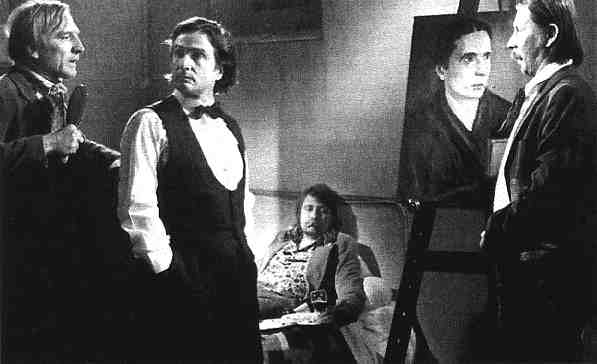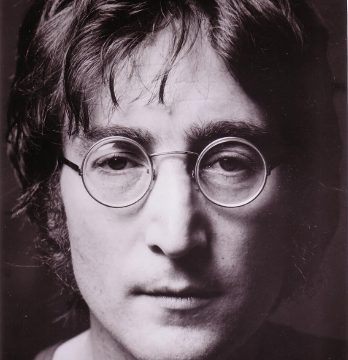
by Colin Marshall
Do even lovers of world cinema think much about Finland’s working class? Does Aki Kaurismäki think about much else? Clearly, when not thinking about Finland’s working class, he thinks about world cinema, even going so far as to produce a short film thanking Yasujirō Ozu for his influence. “So far I’ve made eleven lousy films,” the Finn says to a pair of portraits of the Japanese master, “and I’ve decided to make another thirty, because I refuse to go to my grave until I have proved to myself that I’ll never reach your level, Mr. Ozu.”
But Kaurismäki has reached Ozu’s level, at least by one particularly objective measure: drinking. Both filmmakers have gone on record measuring out their lives by number of glasses and bottles emptied. While Ozu and his collaborator Kōgo Noda might famously have put away 180 liters of sake in the process of writing each and every script, their films usually focused on characters who might only indulge in a couple rounds after work. Ozu’s people tend to operate under a slow but steady upward mobility, albeit one that sends subtly devastating waves through their long-established but delicate familial relationships. Kaurismäki’s people, who might easily drink instead of working, can count themselves lucky to have any kind of relationships at all.
In Finland as Kaurismäki uses it, you might just as well call the working class the drinking class. When he leaves his homeland for La Vie de Bohème, a part of that simple formula goes missing: the French playwright Marcel, the Albanian painter Rodolfo, and the Irish composer Schaunard want to create and want to find women, but above all, they want not to work. At the point the film begins, getting jobs seems to have transcended the position of priority in their lives to become the unquestioned foundational principle of their lives. Though neither successful nor prosperous by any common definitions of the words, they nevertheless hold themselves up higher than, say, the still-teetering wreckages in the Kaurismäki-influenced Helsinki segment of Jim Jarmusch’s Night on Earth. As members of what you could call the non-working class, they skirt the standard set of human obligations with a kind of… style.
No wonder, then, that Kaurismäki set the movie in Paris, a city that even those who know little about it probably think of as the last word in habitats for the discerning layabout. Yet he came to find, of course, that the choice wasn’t quite his to make; after grinding away at adapting Henry Murger’s Scènes de la vie de bohème to the streets of his Helsinki — whether the director’s view of the city warrants the phrase “his beloved Helsinki” remains a matter of debate — Kaurismäki supposedly found that only Paris could host these particular stories. And so, as a result of the special brand of combined open-minded stubbornness and hard-laboring laziness at work here, we viewers find ourselves watching a mostly Finnish cast acting all this out on Parisian streets — with some important players who, lacking so much as a word of French, rely on phonetic memorization.
The freshly evicted Marcel carries, with what must be no small strain, the forbiddingly thick manuscript of his 21-act play. Rodolfo, looking at all times far more hangdog than his canine companion Baudelaire, paints large, stern, yet naïve-looking portraits while hoping that nobody will ask to see his nonexistent visa. Schaunard, who promptly claims Marcel’s semi-vacant apartment, toils over piano-based pieces the recreate the sounds of a traffic jam — all the sounds of a traffic jam. These fellows band together in their own informal way, making a team effort to keep one another in life’s refined pleasures while dedicating themselves to the subforms of art they’ve fashioned for themselves.
Read more »
As you know, it is customary at this time of year for connoisseurs of various types of artistic productions to assemble a list of the most noteworthy releases of the preceding twelvemonth. Unfortunately such a task is only possible for those of us who have been industriously keeping up all year, a group among which I am sad to admit that I cannot count myself. So if it's okay, I thought I'd just present a couple of ordinary mixes, which are, I hasten to add, as chock full of primo material as any best-of-year thing. (Previous posts in this series are here and here.)

 Every morning, millions of humans belt out songs in their showers. There’s no art more popular than song. A great melody is a whoosh of sublime emotion plugged straight into the human heart in the snappiest concentrate imaginable that, once stuck, stays stuck forever.
Every morning, millions of humans belt out songs in their showers. There’s no art more popular than song. A great melody is a whoosh of sublime emotion plugged straight into the human heart in the snappiest concentrate imaginable that, once stuck, stays stuck forever.